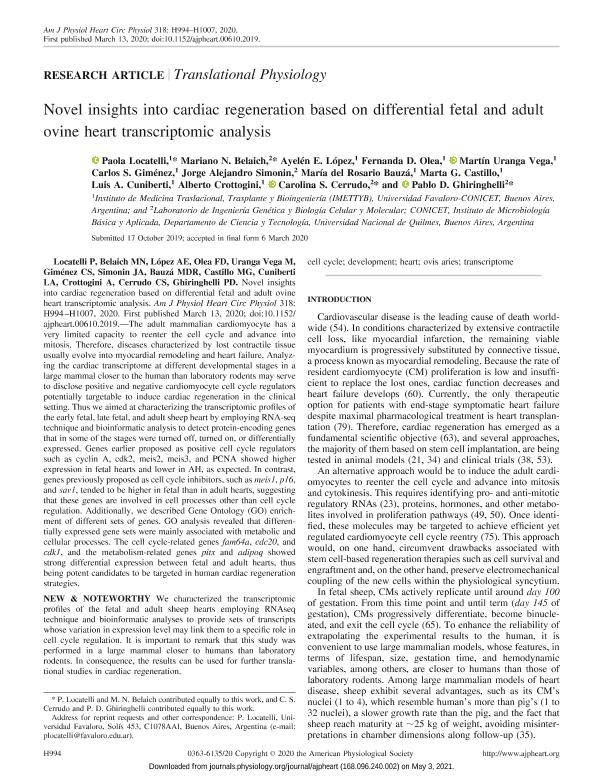Artículo
Novel insights into cardiac regeneration based on differential fetal and adult ovine heart transcriptomic analysis
Locatelli, Paola ; Belaich, Mariano Nicolas
; Belaich, Mariano Nicolas ; López, Ayelén Emilce
; López, Ayelén Emilce ; Olea, Fernanda Daniela
; Olea, Fernanda Daniela ; Uranga Vega, Martin; Giménez, Carlos Sebastián
; Uranga Vega, Martin; Giménez, Carlos Sebastián ; Simonin, Jorge Alejandro
; Simonin, Jorge Alejandro ; Bauza, Maria del Rosario
; Bauza, Maria del Rosario ; Castillo Velasquez, Martha Giovanna
; Castillo Velasquez, Martha Giovanna ; Cuniberti, Luis Alberto
; Cuniberti, Luis Alberto ; Crottogini, Alberto José
; Crottogini, Alberto José ; Cerrudo, Carolina Susana
; Cerrudo, Carolina Susana ; Ghiringhelli, Pablo Daniel
; Ghiringhelli, Pablo Daniel
 ; Belaich, Mariano Nicolas
; Belaich, Mariano Nicolas ; López, Ayelén Emilce
; López, Ayelén Emilce ; Olea, Fernanda Daniela
; Olea, Fernanda Daniela ; Uranga Vega, Martin; Giménez, Carlos Sebastián
; Uranga Vega, Martin; Giménez, Carlos Sebastián ; Simonin, Jorge Alejandro
; Simonin, Jorge Alejandro ; Bauza, Maria del Rosario
; Bauza, Maria del Rosario ; Castillo Velasquez, Martha Giovanna
; Castillo Velasquez, Martha Giovanna ; Cuniberti, Luis Alberto
; Cuniberti, Luis Alberto ; Crottogini, Alberto José
; Crottogini, Alberto José ; Cerrudo, Carolina Susana
; Cerrudo, Carolina Susana ; Ghiringhelli, Pablo Daniel
; Ghiringhelli, Pablo Daniel
Fecha de publicación:
04/2020
Editorial:
American Physiological Society
Revista:
American Journal of Physiology - Heart and Circulatory Physiology
ISSN:
0363-6135
Idioma:
Inglés
Tipo de recurso:
Artículo publicado
Clasificación temática:
Resumen
The adult mammalian cardiomyocyte has a very limited capacity to reenter the cell cycle and advance into mitosis. Therefore, diseases characterized by lost contractile tissue usually evolve into myocardial remodeling and heart failure. Analyzing the cardiac transcriptome at different developmental stages in a large mammal closer to the human than laboratory rodents may serve to disclose positive and negative cardiomyocyte cell cycle regulators potentially targetable to induce cardiac regeneration in the clinical setting. Thus we aimed at characterizing the transcriptomic profiles of the early fetal, late fetal, and adult sheep heart by employing RNA-seq technique and bioinformatic analysis to detect protein-encoding genes that in some of the stages were turned off, turned on, or differentially expressed. Genes earlier proposed as positive cell cycle regulators such as cyclin A, cdk2, meis2, meis3, and PCNA showed higher expression in fetal hearts and lower in AH, as expected. In contrast, genes previously proposed as cell cycle inhibitors, such as meis1, p16, and sav1, tended to be higher in fetal than in adult hearts, suggesting that these genes are involved in cell processes other than cell cycle regulation. Additionally, we described Gene Ontology (GO) enrichment of different sets of genes. GO analysis revealed that differentially expressed gene sets were mainly associated with metabolic and cellular processes. The cell cycle-related genes fam64a, cdc20, and cdk1, and the metabolism-related genes pitx and adipoq showed strong differential expression between fetal and adult hearts, thus being potent candidates to be targeted in human cardiac regeneration strategies. NEW & NOTEWORTHY We characterized the transcriptomic profiles of the fetal and adult sheep hearts employing RNAseq technique and bioinformatic analyses to provide sets of transcripts whose variation in expression level may link them to a specific role in cell cycle regulation. It is important to remark that this study was performed in a large mammal closer to humans than laboratory rodents. In consequence, the results can be used for further translational studies in cardiac regeneration.
Palabras clave:
CELL CYCLE
,
DEVELOPMENT
,
HEART
,
OVIS ARIES
,
TRANSCRIPTOME
Archivos asociados
Licencia
Identificadores
Colecciones
Articulos (IMETTYB)
Articulos de INSTITUTO DE MEDICINA TRASLACIONAL, TRASPLANTE Y BIOINGENIERIA
Articulos de INSTITUTO DE MEDICINA TRASLACIONAL, TRASPLANTE Y BIOINGENIERIA
Articulos(SEDE CENTRAL)
Articulos de SEDE CENTRAL
Articulos de SEDE CENTRAL
Citación
Locatelli, Paola; Belaich, Mariano Nicolas; López, Ayelén Emilce; Olea, Fernanda Daniela; Uranga Vega, Martin; et al.; Novel insights into cardiac regeneration based on differential fetal and adult ovine heart transcriptomic analysis; American Physiological Society; American Journal of Physiology - Heart and Circulatory Physiology; 318; 4; 4-2020; H994-H1007
Compartir
Altmétricas



